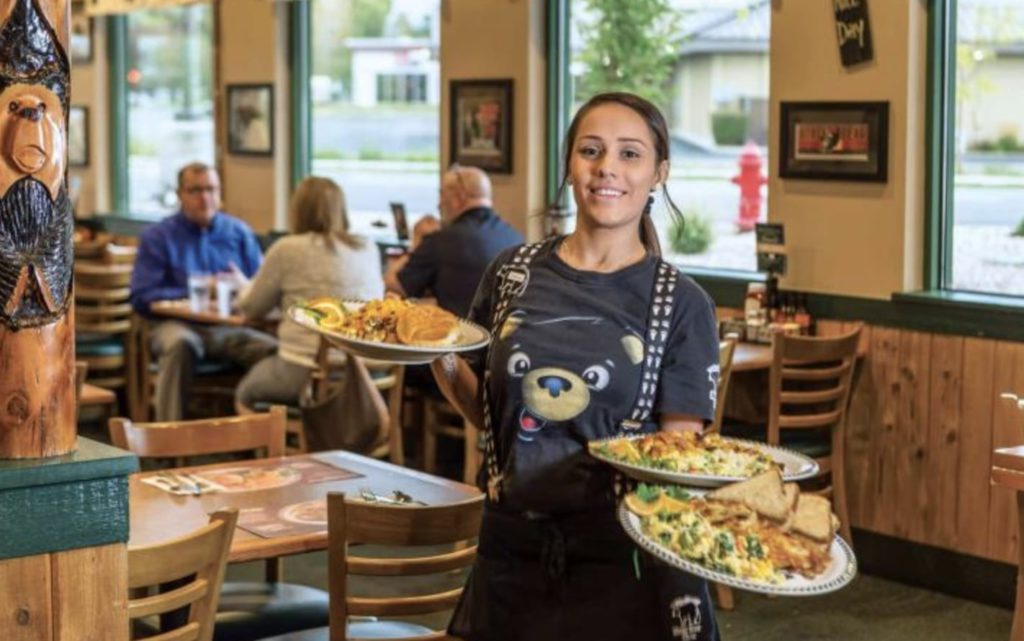Since the very first location opened in Mount Shasta, California, Black Bear Diner has delighted guests in more ways than one.
Since the very first location opened in Mount Shasta, California, Black Bear Diner has delighted guests with a singular dine-in atmosphere. The cabin-themed restaurants sport stone accents, carved wooden bears, and other rustic details.
Combine these distinctive on-site elements with strict COVID regulations in California (which holds the lion’s share of the brand’s locations), and Black Bear Diner would appear especially vulnerable to the chilling effects of the pandemic. But despite the challenges, the chain weathered the storm well. In 2020, it only closed one store (for reasons unrelated to COVID) and opened six units. And last year, it added another.
“It has frankly validated what’s always been important in the past, and then it shows the demand for brands like us when we’ve seen the strength of the recovery,” says Anita Adams, CEO of Black Bear Diner.
Adams joined the company in 2017 as CFO before adding president to her title in 2019. She assumed the chief executive role in January 2020, two months before the pandemic seized the U.S. Though new to the post, she’s deftly guided the brand through two years of widespread upheaval. In that time, off-premises grew from 7 to 20 percent of total sales and has since remained steady even as dining rooms fill back up. As of January, same-store sales were up 16 percent compared to 2019 levels.
“It’s a wonderful opportunity for us to push our historical $2.6 million AUV. So for us, that’s really been the growth around off-premises,” Adams says. “We were very much an experiential brand, so that guest experience in our four walls matters immensely. [We’re] looking to protect that in addition to facilitating off-premises.”
When Black Bear Diner first opened in 1995, it fell squarely into the family-dining category. But over the years, it’s embraced NextGen Casual ideals, such as elevating menu offerings, improving animal welfare practices, and supporting various social and environmental causes. (Most recently, it kicked off a fundraising campaign to open a rehabilitation center for bear cubs orphaned or injured by wildfires.)
The chain also stands by a community-driven, people-first ethos, which was on full display during the pandemic. To mitigate the negative impact on franchisees, it paused royalty fees and increased the frequency of communication between operators and corporate.
“We have this really strong franchise base, and their resilience through all of this has been amazing,” Adams says. “We spent the last six months re-firing up our development and that’s both corporately and then with our franchise partners. We’re so excited to say that we are sitting at this place and time with all of our franchise partners still intact.”
Adams adds that while the brand averages about 10 corporate and 10 franchised units annually, she foresees the latter exceeding that figure in the coming years. Black Bear Diner aims to once again hit its 20-unit average in 2022, and next year could be even bigger, thanks in large part to the Lone Star state. The restaurant entered the greater Houston area in 2018 and has since opened half a dozen more diners in the general vicinity. This year, it’s slated to expand into Dallas and San Antonio.
Texas has also been a site for innovation, with the Brownsville location promoting a new design. Smaller than the typical Black Bear Diner (which clocks in around 6,000 square feet), the prototype incorporates new elements geared for off-premises, including a separate cooking line and a pickup window for third-party orders. The restaurant also includes patio dining—a feature some existing units have already added or will in the future.
For all the changes Black Bear Diner has embraced over the past two years, Adams also credits the brand’s strong foundation for its continued success.
“Chaos can introduce a way that people just have to dig deep, and I think we’re just really proud as an organization and the things we’ve addressed,” Adams says. “We feel like we’re in a position of strength, and we’re pretty thankful for that.”
